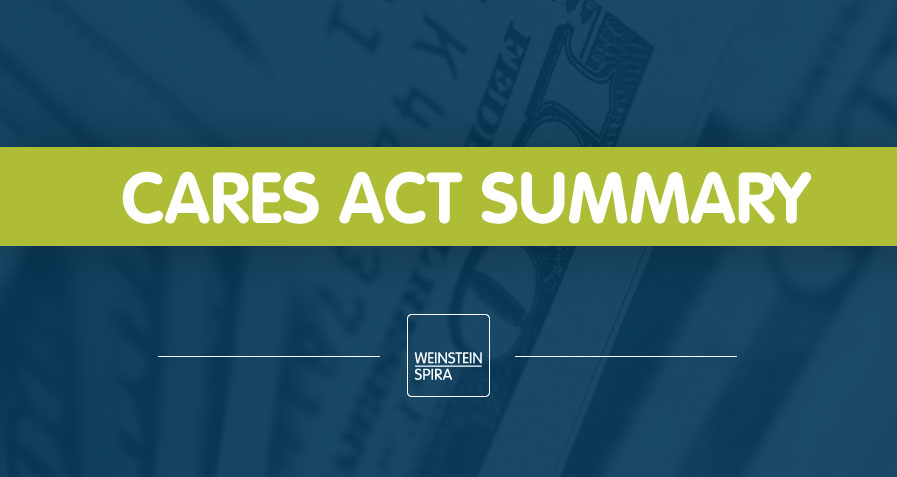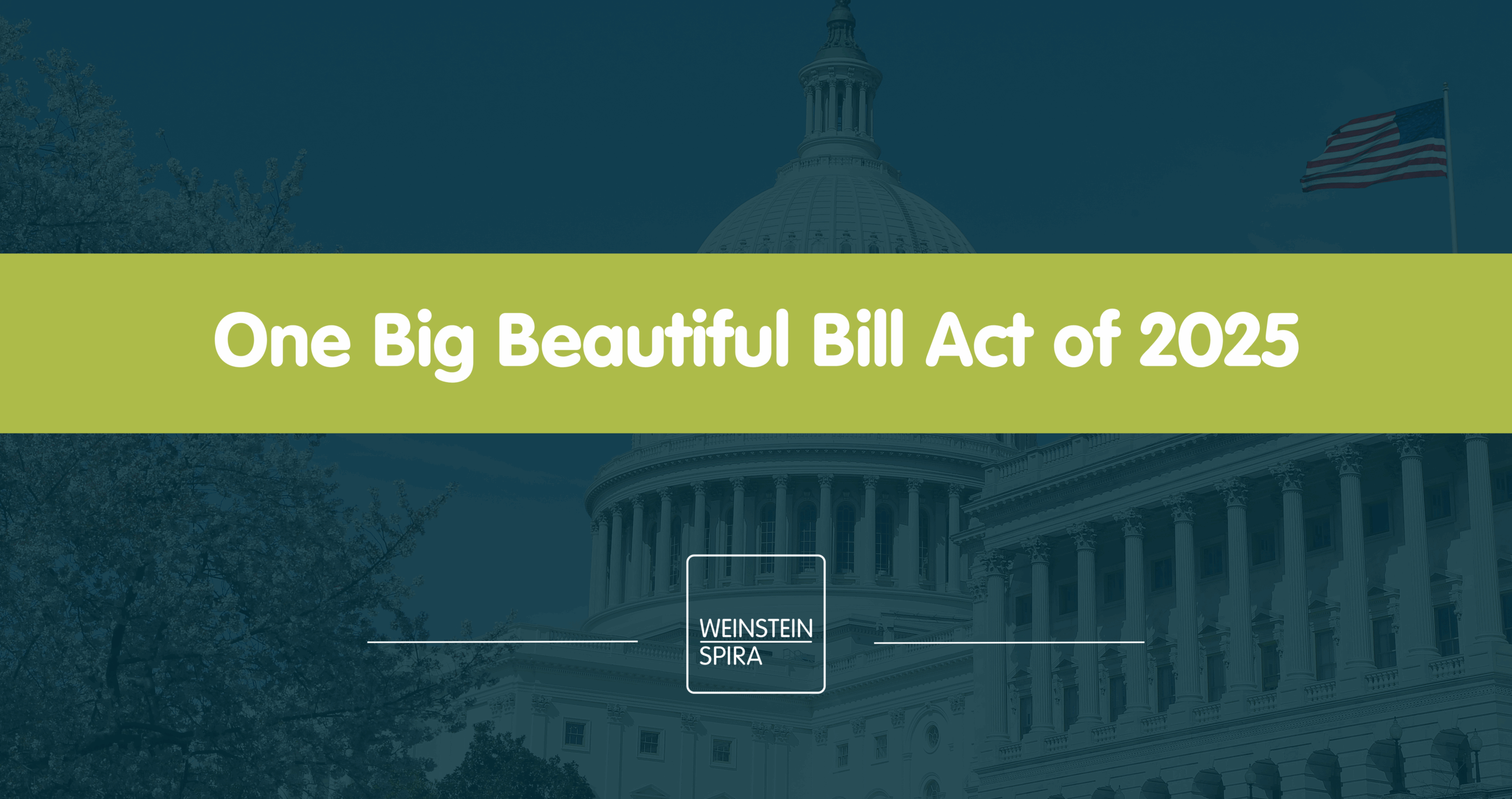Relief Available for Businesses and Individuals
The Coronavirus Aid, Relief, and Economic Security Act (the Act) became law on March 27, 2020. The estimated $2+ trillion and 880-page legislation includes public health spending, immediate cash relief for citizens, a lending program for small businesses and targeted relief for hard-hit industries.
A brief summary of the Act follows:
Please contact Weinstein Spira with specific questions regarding the Act.
Small Business Interruption Loan Program
Loan Terms
- The SBA allows loans under the same terms, conditions and processes as the SBA’s current Business Loan Program.
- No collateral or personal guarantee is required.
- The interest rates on these loans will not exceed four percent.
- A loan made under the SBA’s Disaster Loan Program on or after January 31, 2020 may be refinanced under this new program.
Loan Recipients
- Eligible businesses include any business concern or nonprofit organization, if they employ no more than 500 employees or the size standard (in number of employees) established by the SBA for the entity’s industry.
- Special Eligibility Rule: If a business is in the hospitality and dining industries with more than one physical location, but employs 500 or fewer employees per location, and is assigned to the “accommodation and food services” sector (Sector 72) under NAICS, the business is eligible to receive a loan.
- Sole proprietors, independent contractors and eligible self-employed individuals are eligible loan recipients, subject to some documentation requirements to substantiate eligibility.
Loan Maximum
The maximum loan amount is the lesser of:
(1) 2.5 times average total monthly payroll costs incurred in the one-year period before the loan is made or
(2) For businesses that were not in existence from February 15 to June 30, 2019: 2.5 times the average total monthly payroll costs from January 1 to February 29, 2020 or
(3) $10 million.
Businesses may use the loans for payroll costs, group health care benefits, compensation, mortgage interest payments, rent/lease agreement payments, utilities and interest on any other debt obligations incurred before the covered period.
Loan Forgiveness and Payment Deferral Relief
The Act provides businesses operating on February 15, 2020 that have pending or approved loan applications under the Act an opportunity for complete payment deferment relief for six months to one year.
In addition, indebtedness is forgiven in an amount equal to the following costs and payments made during the covered period: payroll costs, mortgage interest payments, rent and utilities.
- The amount forgiven may not exceed the principal amount of the loan.
- The amount forgiven will be reduced proportionally by any reduction in employees retained compared to the prior year and reduced by the reduction in pay of any employee beyond 25% of their prior year compensation.
- Borrowers that re-hire previously laid off workers will not be penalized for having a reduced payroll at the beginning of the period.
Business Provisions
Employee Retention Credit
The Act provides eligible employers a refundable credit against payroll tax liabilities equal to 50% of the first $10,000 in wages per employee. Eligible employers must have conducted business during 2020 and
- Have business operations (fully or partially) suspended due to governmental orders limiting the entity’s commerce, travel or group meetings; OR
- Are experiencing a year-over-year reduction in gross receipts of at least 50%. Once gross receipts exceed 80% year-over-year the credit is no longer available.
For businesses that have over 100 employees, only employees who are not currently working due to coronavirus causes are eligible for the credit.
Deferral of Payroll Taxes
The Act postpones the due date for employer payroll taxes and 50% of self-employment taxes related to Social Security. Deferred amounts are payable over the next two years with half due December 31, 2021 and the rest due December 31, 2022.
Charitable Donations
The Act increases the 10% limitation on corporate charitable donations to 25% and increases the 15% charitable donation limitation on food inventory to 25%.
Net Operating Losses
The Act suspends the current 80% limitation on the utilization of net operating losses for taxable years beginning in 2018, 2019 or 2020. It allows net operating losses arising in 2018, 2019 or 2020 to be carried back five years.
Business Interest Expense Limitation
The Act temporarily increases the deductible interest expense by increasing the 30% limitation of taxable income to 50% for 2019 and 2020.
Qualified Improvement Property (QIP) Technical Correction:
The Act provides a 100% bonus depreciation deduction for costs associated with the interior improvement of non-residential property by changing the tax life from 39-years to 15-years (and is retroactive to include any improvements made after September 27, 2017).
Estimated Tax Payments
The Act postpones corporate estimated tax payments (due after the date of enactment) until October 15, 2020.
Individual Provisions
Recovery Rebates
The Act provides for payments of up to $1,200 ($2,400 for joint filers) for US taxpayers. Amounts are increased by $500 for each child. Amounts are phased out for taxpayers with adjusted gross income of more than $75,000 ($150,000 for joint filers, and, $112,500 for heads of household).
Early Distributions from IRA and Retirement Plans
The Act waives the 10% excise tax for early distributions related to hardships resulting from coronavirus. The distributions cannot exceed $100,000 from all plans. Amounts distributed may be repaid at any time over the three-year period commencing on the date the distribution was received. Any amounts not repaid to the plan over the subsequent three years will generate taxable income. This amount will be included in taxable income ratably over three years.
Required Minimum Distributions
The Act suspends the required minimum distributions from IRAs and retirement plans for the 2020 calendar year.



